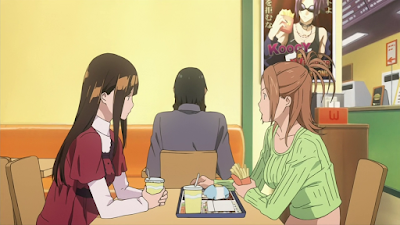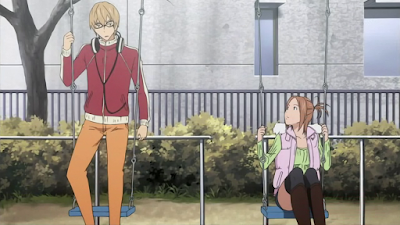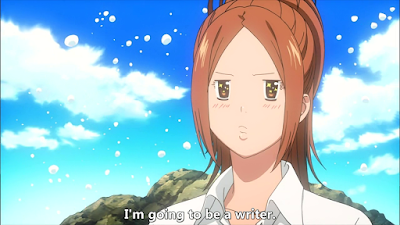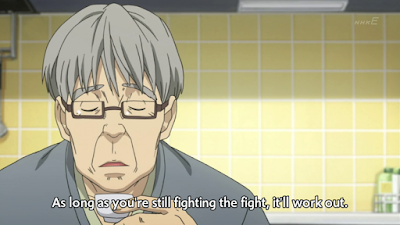
Bakuman is often criticized for its misogynist undertones and from the first episode it was clear that the show’s portrayal of women was odd. But what is the source of Tsugumi Ohba’s low opinion of women? I believed that the Misogynist vibe in Bakuman is rooted in the Japanese work ethic and comes from the intense pressure to succeed. The success of Mashiro and Miho’s relationship in Bakuman is dependent on their individual career success. In essence, Bakuman is removing the emotional element from relationships and basing them on status alone. While that is true at the core of the problem it seems that the blame may rest directly on the author.
 Women are portrayed as obstacles in the path of men who are trying to reach their goals. In the most direct sense, Moritaka’s mother refused to allow him access to his Uncle’s studio and refused to accept his dream of becoming a Mangaka. It was his Father and Grandfather who stepped in and insisted that he be allowed to pursue his dream, telling the mother that some things “men have to do that woman can’t understand”. This applies also to romantic relationships and why Miho is set up as the ideal woman. Miho also has a goal she is trying to accomplish, and no other woman in the series seems to share her values. She wants to put off their relationship knowing that it would get in the way of her dream of becoming a voice actress. The “normal” girl is shown during a scene when a young girl chases her boyfriend to the roof chastising him the entire way for changing his High School of choice. She is upset because they won’t be together. This is what Ohba sees as the normal girl, chasing after a boy and having no goals of her own. The action of the young man is what the author acknowledges as the correct choice, personal progress over romance.
Women are portrayed as obstacles in the path of men who are trying to reach their goals. In the most direct sense, Moritaka’s mother refused to allow him access to his Uncle’s studio and refused to accept his dream of becoming a Mangaka. It was his Father and Grandfather who stepped in and insisted that he be allowed to pursue his dream, telling the mother that some things “men have to do that woman can’t understand”. This applies also to romantic relationships and why Miho is set up as the ideal woman. Miho also has a goal she is trying to accomplish, and no other woman in the series seems to share her values. She wants to put off their relationship knowing that it would get in the way of her dream of becoming a voice actress. The “normal” girl is shown during a scene when a young girl chases her boyfriend to the roof chastising him the entire way for changing his High School of choice. She is upset because they won’t be together. This is what Ohba sees as the normal girl, chasing after a boy and having no goals of her own. The action of the young man is what the author acknowledges as the correct choice, personal progress over romance.
What becomes the enemy in Bakuman are laziness, sloth, and complacency. Relationships are portrayed as wastes of time and energy. Moritaka doesn’t have time to go see a movie because he uses every bit of his free time perfecting his skill as a mangaka. Akito’s relationship with Miyoshi becomes the model for what relationships can do to one’s time, energy, and goals. At the start of their relationship she constantly tries to take Akito away from his work in order to go to spend time with her. Most of the time Akito refuses and Miyoshi is left upset, but slowly she begins to understand what Akito and Moritaka are trying to do. Unfortunately, this leads to the most condescending portion of the series.

Miyoshi becomes jealous of all her friend having goals except for her, so she decides one day she is going to be a writer. Her decision comes from the desire to fit in; the group has Mangaka and a voice actress but no prose writer; not from the desire to actually become a successful writer. She decides to write Miho and Moritaka’s story instead of coming up with an original idea and not knowing where to begin she enlists Akito for help. Instead of Akito working on his own story, he ends up helping Miyoshi with her romance novel and, in fact, writes the whole thing. She becomes excited for herself when the first part of the novel becomes a success and takes all the credit. Miyoshi displays no personal motivation; she enjoys the end result of hard work. She is the antithesis of Miho, Moritaka, and Akito. The dream ends when Akito refuses to write the next part of ‘her’ successful cellphone novel. She tries but quickly gives up writing it herself, changing her dream to be the same as Akito’s dream. Her ‘goal’ in life becomes that Akito and Moritaka become famous Mangaka, showing she has no aspirations of her own and has to live in the shadow of her boyfriend. After Miyoshi realizes she almost broke up her boyfriend’s team she goes from being bitter that Akito doesn’t have time to spend with her and jealous of Moritaka and Miho’s dream, she gives up and becomes a cheerleader for them. She is content to be in the background getting tea and making meals for the hard-working Mangaka. She is happy to fall into a domestic role after Akito promises to marry her, which reveals her only true aspiration to be marriage, everything else being a method of getting Akito to notice her.
 Miyoshi’s role in the story says a lot about Ohba’s view towards women. It is comparable to his Death Note character Misa. Misa initially begins her own Death Note fueled rampage in order to get Kira’s attention, but once Kira pretends to be in a relationship with her she becomes completely obedient to him. Akito’s mother also follows this pattern, while she is a successful school teacher her husband losing her job breaks her, almost cripples her emotionally. She decides to channel the disappointment in her husband into her children, pushing them hard so they don’t fail. Instead of picking herself up and focusing on her career, she relied on her husband to create a stable household. It seems that Ohba’s view on women is that they only show initiative to attract men. The obvious way this is portrayed in both Death Note and Bakuman suggests this might be a conscious bit of social criticism; however it is more likely that he just can’t write female characters in any other way. Nothing is known about the Mangaka’s personal life, if he is married or in a relationship, the most the public knows is that he collects teacups and “develops manga plots while holding his knees on a chair.” Whether his opinions on women come from bitterness or ignorance may never be answered definitively but the blankly negative female character he has written makes the answer a bit obvious. There is, of course, one exception to his negative female characters. The heroine of Bakuman, Miho, is written as the ideal woman.
Miyoshi’s role in the story says a lot about Ohba’s view towards women. It is comparable to his Death Note character Misa. Misa initially begins her own Death Note fueled rampage in order to get Kira’s attention, but once Kira pretends to be in a relationship with her she becomes completely obedient to him. Akito’s mother also follows this pattern, while she is a successful school teacher her husband losing her job breaks her, almost cripples her emotionally. She decides to channel the disappointment in her husband into her children, pushing them hard so they don’t fail. Instead of picking herself up and focusing on her career, she relied on her husband to create a stable household. It seems that Ohba’s view on women is that they only show initiative to attract men. The obvious way this is portrayed in both Death Note and Bakuman suggests this might be a conscious bit of social criticism; however it is more likely that he just can’t write female characters in any other way. Nothing is known about the Mangaka’s personal life, if he is married or in a relationship, the most the public knows is that he collects teacups and “develops manga plots while holding his knees on a chair.” Whether his opinions on women come from bitterness or ignorance may never be answered definitively but the blankly negative female character he has written makes the answer a bit obvious. There is, of course, one exception to his negative female characters. The heroine of Bakuman, Miho, is written as the ideal woman.
I’ve already stated some reasons why Miho is the ideal woman in the series. I will restate some of that and build on top of it here, because Miho is the antithesis of every other woman in Bakuman, for positive and negative reasons. Unlike the other women in Bakuman Miho actually has a personal goal, she wants to become a voice actress and even though she is meek and shy she is pushing forward with that dream no matter what it takes. In that respect she is equal to Moritaka and superior to any other woman in the show. She is the ideal girlfriend in that she stays out of the way, she doesn’t ask to be taken out, and she doesn’t get involved with Moritaka’s business. She remains on the sidelines as a silent cheerleader. She only contacts Moritaka when she actually has something to say, mostly congratulate him, and she never brags about her own accomplishments. She is also extremely loyal and in love with Moritaka without any real reason to be loyal or in love with him. She is his fantasy girl and all he has to do is become a Mangaka, which was his childhood fantasy, and she will marry him. 
Bakuman is about a Mangaka, and in order to be happy the Mangaka has to create a successful manga. It is clear that Miho is the ideal woman for Ohba and that every other woman in the series represents Ohba’s narrow view of woman and that he, as a successful mangaka, should have found true love. While it is unusual to make assumptions on the author’s personality from a piece of fiction I think Bakuman is an exception. It is, after all, a story written about Ohba’s profession that combined with the consistency of his female characters. Bakuman is the result of an author constructing a fantasy in which he can be the hero and get the girl as an author. If we take the experiences of Akito and Moritaka as true reflections of Ohba’s life; working to become Mangaka to the exclusion of all else; Ohba might be the teacup collecting lonely writer that his only existing bio makes him out to be. To the end Bakuman is the fantasy of a man who has dedicated himself, with the vigor of a Japanese businessman, to his art and never had time to find someone to love.
I wrote a similar article to this a year or two ago. I think that the portrayal of women comes from the portrayal of women in shounen manga in general and the relation of women to shounen manga, seeing how Bakuman is so meta about everything. So you've got women as say, prizes or killjoys or deadweights because that's what they frequently are in shounen manga (every echi comedy/tons of moms/all of the female competitors in fighting series, respectively for example).The "relation of women to shounen manga" part comes from the increasing acknowledgment of women as one of the major consumers of shounen manga. I think that the gender breakdown is pretty close to 50/50. The sort of thing that I'm thinking of here is the opposition to more and more shounen manga being tilted towards their large (and possibly entirely) female base. Think series like Hitman Reborn here.
LikeLike
boy… do you take comics and cartoons too seriously or what?
LikeLike
I think there's a further wrinkle that's worth examining: Miyoshi's presence versus Miho's abscence.I actually like Miyoshi more than Miho because I gravitate to characters with her personality. True, Miyoshi doesn't have an overriding dream, but she has zest for living in excess. It's why she gets on with Shuujin so well who despite his calculating appearance is actually a maniac. HOWEVER, I agree with your analysis that Ohba sets up the budding (moeee~~?) voice actress as the ideal, so it's interesting that in her relationship with Mashiro is defined by being long-distance. What he's saying is no matter how, cute, supportive, or vivacious, the ideal place for a woman to be is NOT AROUND.This frustrates me immensely, especially when compared to the works of Ai Yazawa, who runs a similar theme through her works (she's exceedingly judgmental of characters without a dream or a goal). See, Mikako was always around, as was Tsutsomu and the pair gained energy and drive from being in each other's presence. Meanwhile Ohba demonstrates repeatedly that the interaction between Mashiro and Miho must be carefully limited, less it ruin the pair. You can use this observation to extrapolate that Ohba doesn't care much to evolve his female characters, especially if their development is in pursuit of the "ideal" Miho. Any advances they make towards what he wants them to be will have them written out of the story.Obata should jump ship and get back with Yumi Hotta to bring us more Hikaru no Go chapters.
LikeLike
I hardly see this manga as misogynistic at all. True, there are the cases you mention of men being portrayed as superior to women, but there are also plenty of cases that convey exactly the opposite. Consider, for instance, Nakai, who is himself often cast as a piggish misogynist. He is repeatedly portrayed as inferior to the female characters he interacts with. Next, consider Hiramaru, who is portrayed as a laughably pessimistic person with no real attractive qualities. Yet, Aoki humbles herself by dating him and even ultimately marrying him.This brings me to my second point, namely, not only are there plenty of males portrayed badly in this anime, but there are also plenty of females portrayed favorably. At least, there are certainly plenty who are not portrayed in the way that you describe. Aoki is a case in point, she is beautiful, charming, intelligent, and successful – not to mention very likable to the audience. There is also Iwase, who is similarly beautiful, intelligent, and successful (though not always quite so charming) – in fact, I would say that both of these characters are portrayed as being far more successful than almost any male character in the entire anime, being that they are both not only successful manga artists, and are both desired by many men romantically and otherwise, but they are also graduates of top tier universities (an distinction that no male character in the series can boast), not to mention that Iwase has a successful author, having published a popular and critically acclaimed novel at a shockingly young age. Accordingly, not only are these female characters successful as mangaka, but they are highly successful outside of the manga world as well. This also makes them more worldly than the male characters, which isn't a trait of downtrodden female characters. I agree that Miyoshi and Mashiro's mother are both portrayed misogynistically, but these are only 2 characters in a huge cast (and the latter of the two is barely even in the series at all). If you consider all of the characters together, they span the range from misogynistic to gender neutral to misandrist, so if you can argue for any of those three interpretations if you choose the characters and cases that match them, but, if you survey the manga as a whole, none is more prevalent than the others (at least not significantly so).
LikeLike
@Timmy – to only consume pop-culture and creative mediums (ie. films, cartoons, music) and never question or analyze what it is that you are looking at or listening to is just lazy. Considering that Bakuman is a supposed "fact-based" work (ie. how Shonen Jump! operates) and a best-selling comic in both Japan and North America, why wouldn't you want to take a closer look at it?@Attic – you seem a little conflicted in your comment, you say Bakuman is "hardly" misogynistic, and then go on to agree with the author of the article about all the elements that have misogynistic elements (which I would have to argue is a lot). I'd have to disagree about how "Aoki humbles herself by dating [Hiramaru] and even ultimately marrying him." But Aoki is a fairly weak character, essentially the only female artist/writer at Shonen Jump! and she basically has to be hand-held/tutored by the male creators to make popular or decent work. She also used as a prop- as part of Yoshida's plans to improve Hiramaru's manga and Nakai's lifestyle by encouraging them to work hard (And together) with an idea…. that not really a "strong female character" is it? (Does the anime include the scene where she says to Nakai "hit me until your satisfied"? Because that's in the manga, and the misogyny of that scene speaks for itself).Also interesting how the first word you wrote to describe both female characters was "beautiful". I think its also part of the issue- all the female character are there foremost to look good or to be a prop for romantic interest- their personalities and skills come second.
LikeLike